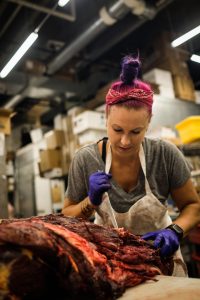Roxanne Spruance talked to Food Karma’s Communications Director, Dylan Heuer, about finally being a judge – rather than a TV show contestant – on “The Butcher,” the importance of shifting consumer trends around meat, and why she is excited to return to Pig Island.

Dylan Heuer: You started your culinary career as a pastry chef apprentice, how did you end up where you are today?
Roxanne Spruance: I started in pastry mostly because I was too little to cook with the big boys. I mean I was 15 years old at Blackbird in Chicago, the year that it opened. [It’s] not really a place to have a kid on the line. So I worked under Pastry Chef Elissa Narrow, which was amazing. I just moved forward from there. Eventually [I] started to learn savory at different places. It’s awesome having a pastry background, while doing savory. I approach flavors in a very different way. There’s always a multi-component aspect to [my] dishes. There’s always a sweet-savory balance in things that I try to do.
Dylan Heuer: How did you get into meat and butchery, in particular?
Roxanne Spruance: That was a product of food cost mostly. It was one of those things where, you know, every restaurant is concerned about food cost, and the more processed you get something from your meat guy, the more expensive it’s going to be because they’re doing the labor. So if it’s your labor and you’re already there – then go for it! I started working on bigger and bigger primals, until I started to just do whole animal stuff. [I’m] mostly self-taught in terms of butchering. [I] picked up some techniques along the way at different places, but I grew up in the Midwest, hunting [and] fishing so I’m familiar with field dressing and doing deer custom processing. I ended up majoring at Michigan State in both Environmental Biology/Zoology and Fisheries and Wildlife, so the anatomy thing comes quite easily to me. When you’re doing butchery most of it is seamwork. The animals kind of show you where to go; you articulate the joints. It’s kind of intuitive.
Dylan Heuer: Tell me about what food traditions most inspire you.
Roxanne Spruance: For me, having come up in classically French kitchens with the brigade system – that’s how I run my kitchens. I think the basis of French food in general opens so many doors to the culinary world and the history behind it. I would say that my second big influence would be Japanese cuisine, which is extremely ingredient driven [and] clean. The combination of those two principles is really what guides my cuisine.
Dylan Heuer: You’re currently a judge on the History Channel Show The Butcher. What has that been like and what have you learned from the experience?
Roxanne Spruance: It’s been such a blast. I had never really done anything like that, you know? I competed – I won Chopped, and other [similar shows]. But [this was] like summer camp for adults. We’re all still on a group text together. It was fantastic. I was the only chef on the panel that does whole animals, the other two guys are butchers. It’s really interesting learning and seeing everyone else’s perspective on things because there is more than one way to do all this stuff. So it’s really cool to see other techniques, [and] other little tricks that people have learned. The ratings were great, the reviews were great and we’ll find out about the next season in the next month or two.
Dylan Heuer: How was it taking on the role of a judge, instead of being a contestant as you have been in the past?
Roxanne Spruance: So much better (laughs). What I liked about [The Butcher] that was different from cooking shows is that it’s much more objective. If I were to cook something one way, the way that I prefer it, maybe a judge doesn’t prefer it that way. [If] it’s too salty for them, or too much acid, or whatever – you can get docked. But on The Butcher it was much more of a conversation about: “Okay, here’s your cut list. How many cuts did you get out of this list that we gave you?” We’re only really rejecting [a cut] if it’s nicked, they didn’t clean the silver skin off properly, [if they] cut their brisket in half, things like that. It’s much more goal-oriented, [rather] than based on someone’s opinion, which is nice.
Dylan Heuer: How do you respond to critiques that the meat industry is problematic and unsustainable?
Roxanne Spruance: It’s ridiculous to think that the entire world is going to become vegan. That’s just not a practical situation. The big difference that I think people don’t understand is: there’s a huge difference between getting a burger at McDonald’s and getting beef from a local guy. There’s a huge difference between factory farming and independent farmers and I think that kind of gets muddied. It drives me absolutely insane when people try to force upon you that meat is bad. Meat’s not bad, a lot of big agriculture practices are bad. You could say the same thing about corn, or the lack of biodiversity [with] bananas. It’s the same thing with soybeans. So to villainize meat without a true understanding is wild to me.
Our system is so flawed. The more that you learn about it, it’s overwhelming. But there has to be some sort of education and understanding for the consumer. I feel like there should be more practical key words that people are using. Instead of saying “do meatless Monday” [or] “eat less meat” – just stop eating fast food. How about we start with that? Because that covers a ton of different things, like corn and soybeans, and of course the meat component of that, which is the worst way that you can consume meat. I think there needs to be more of a difference that’s made between an independent Heritage breed meat industry versus commercial commodity ‘Big Ag’ that started post World War II.
Dylan Heuer: Last year you won Best Presentation at Pig Island. What edge does your experience give you in the competition this year?
Roxanne Spruance: Oh man, this has got to be like my fourth year [competing in Pig Island]. What I think is cool about Pig Island is it’s become more competitive since I started with it. Shit happens during service at a restaurant [and] you gotta figure it out. [At Pig Island] you’re cooking outside, there’s obviously tons of room for things to go wrong. And what makes chefs really good is being able to troubleshoot in those situations. But it’s still just really fun for all of us to hang out with each other. I think that’s my biggest takeaway – seeing people that I don’t necessarily get to see all the time because we’re all working and traveling.
Dylan Heuer: Tell me about the dish you’ll be preparing for Pig Island.
Roxanne Spruance: The one that I’m leaning towards is a take on Vietnamese larb. It’s a Southeast Asian salad that’s made with meat and a bunch of veg and seasoned with a ton of fish sauce. I love pork [with] fish sauce – [it’s] like [an] umami bomb together. So it’s definitely going be to cilantro, mint, lots of Southeast [Asian] flavors.

